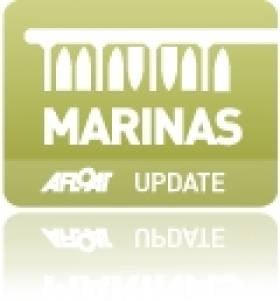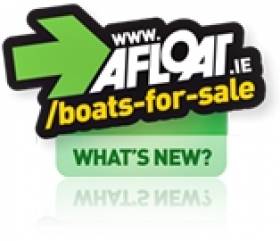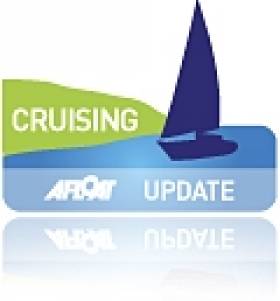Displaying items by tag: diesel
Diesel Laundering Has Polluted Key Salmon River Say Anglers
#Pollution - The effects of diesel laundering over decades in South Armagh are being felt even greater today, say Dundalk anglers, as the New Year starts with the River Fane closed to all but catch-and-release fishing.
As Independent.ie reports, a 10-fold decrease in stocks of salmon as well as brown trout and sea trout in the river, which flows into Dundalk Bay from the Monaghan-Armagh border, is the direct result of diesel laundering operations by the IRA since at least the 1980s.
Waste from the process of converting subsidised agricultural 'green' diesel to 'white' diesel for general road use has reportedly been dumped openly into a tributary of Lough Ross, which feeds into the Fane – a river that supplies drinking water to Dundalk and much of North Louth.
A recent study found that these pollutants include polycyclic aromatic hydrocarbons or PAHs, the same chemicals that continue to affect spawning grounds in areas impacted by the Exxon Valdez oil spill in Alaska 26 years ago.
Independent.ie has much more on the story HERE.
Marine Diesel Fuel in Ireland – The Real Problem is Not Price Or Duty, It's Availability & Quality
#dieselfuel – The current controversy rumbling on in various outlets – most notably in the Irish Times letters pages – about how the Irish government has been dealing with EU Directives for differentiating between duty on diesel fuel for fishing boats, as opposed to a higher rate for pleasure craft, has obscured the fundamental problem of the ready availability or otherwise of good quality diesel fuel at remote parts of the coast writes W M Nixon.
Smart-alec comments about a favourable price structure for "wealthy yacht owners" dating back to the time when a certain Taoiseach was a noted boat enthusiast are a complete red herring as regards green diesel. The reality is that for auxiliary sailing cruisers, in the context of all the expenses of voyaging to remote areas such as the west of Ireland or Scotland's Hebrides, the relative price of diesel fuel comes way down the scale of considerations. The primary considerations are its ready availability (or not), and its quality.
Just recently, the quayside diesel pump at Burtonport in Donegal has been closed down, citing lack of business. This means that an entire swathe of our northwest coastline has no convenient means of supplying diesel to boats. Another problem is that when the quayside pump is used only occasionally, the fuel can stagnate. That said, the average boat owner, on seeing a quayside pump at a time when his own tank is running low, will dearly wish for the convenience of being able to take fuel on board cleanly and neatly without any further hassle, hoping that the fuel supplied won't result in a blockage despite the onboard filters.
Personal experience of the frustration which a "fishing boats only" diesel supply rule can cause came to me some years ago in a remote port in northwest Spain, where the fisherman's co-op had a quayside pump which was legally entitled to supply only its own members. With the possibility of mid-Biscay calms in prospect for our passage home to Ireland, we needed all the spare diesel we could get. Becoming a member of the Cedeira Fisherman's Co-op would have been a lengthy process taking several days even had it been allowed, but the obliging coo-op manager – a very decent man – drove me in his car with our spare jerry-cans to a garage on the far outskirts of the village, where they were filled with road diesel.
It was an absurd process, relying on the kindness of strangers. Needless to say, as we'd taken this trouble to get spare diesel, the breeze held for the whole way home. And we'd good winds too for a subsequent round Ireland cruise that same year, so the Cedeira diesel was well travelled when it was finally used.
Nevertheless if we wish to develop Ireland as a cruising destination for ourselves as much as overseas visitors, some new thinking is needed on the whole area of the supply of marine diesel. We all know how to get it as conveniently as possible in our own home ports. But in remote areas, it may well be that the drawbacks of maintaining an irregularly-used quayside pump outweigh any advantage, and there's surely merit to the suggestion by Cliff Hilliard, Hon. Sec. of the Irish Cruising Club, that filling stations at strategic locations around the coast be encouraged to invest in small tank trailers to deliver the white diesel which is now mandatory to the quayside.
Those who take on board diesel in industrial quantities, such as large motor yachts, may have other thoughts on the matter - all your views are welcome here.
#dieselforboaters – The problem of lack of fuel supplies around the Irish coast just got a little bit easier with the news that the popular south coast marina at Kilmore Quay in County Wexford has installed a new diesel fuel oil facility. The new equipment dispenses filtered low sulphur marked gas oil. Payment for the service can be made by credit and debit card. The self service system is available on a 24/7 basis and available to all harbour users.
More information from Marine Officer, Captain Phil Murphy, Wexford County Council, email :[email protected], Tel 053 9129955 (Kilmore Quay) / 9122300 (Wexford Harbour) and Fax 053 9129915.
Diesel Fuel Availability on Ireland's Inland Waterways
As far as I can see, there are only seven places on the Irish inland waterways where you can park your boat at a diesel pump and fill up with marked gas oil (green diesel) from a seller who is legally allowed to sell it to you. All seven are on the Shannon; at time of writing (19 March 2013) there were none on the Grand Canal, Royal Canal, River Barrow, Erne (the part in the republic) or Shannon–Erne Waterway.
Behind this is a scheme [TinyURL http://tinyurl.com/bw29twk] introduced in 2012 by the Revenue Commissioners:
From 1st of October 2012, Section 101, of the Finance Act, 1999 (as amended by the Finance Act 2012) requires all Marked Fuel Traders who produce, sell, deliver or deal in, or keep for sale or delivery, any marked gas oil or marked kerosene to take out a Marked Fuel Trader's Licence. A separate Licence is required for each premises or place from which a trader operates.
Since last October, anyone selling or delivering green diesel, or keeping it for sale or delivery, should have applied for a Marked Fuel Trader's Licence, which costs e250 a year. Revenue requires regular returns of "oil movements".
Revenue has been publishing lists of holders of those licences and I've been reading them every week. At first, I could identify no Shannonside fuel retailers, so I checked with Revenue to make sure that the scheme did apply to private pleasure craft; it does, and I have heard that Revenue has already visited at least one boatyard.
The first Shannon fuel-seller to get a licence was Ciaran Fallon of Rooskey Craft & Tackle at Rooskey Quay. The other six licence-holders are CarrickCraft at Carrick-on-Shannon and Banagher, Emerald Star at Carrick-on-Shannon and Portumna, Hanley's Marina at Ballyleague (opposite Lanesborough) and Quigley's at Killinure on Lough Ree.
At time of writing, there is no licensed seller north of Carrick or south of Portumna. However, I may not have identified all the waterways fuel sellers correctly, and I would be happy to have my errors corrected. Updated lists of licensed marked fuel traders can be downloaded from http://www.revenue.ie/en/tax/excise/.
Boats to be Sold in Cork Liquidation Sale
Fancy a pre-season boat bargain? It may well be on offer later this month at a 'liquidation sale of boats' due to take place in County Cork with a selection of unused and used power boats. The sale is by order of Mr. Barry Donohue, KPMG, Liquidator, HM Yachts Ltd (In Voluntary Liquidation).
The boats on offer include three unused Jeanneau motoboats inlcuding the popular Merry Fisher Legend. The vessel comes with Suzuki 50HP Four Stroke Engine and road trailer, ready for the season!
The sale will take place at 12 noon on Tuesday 29 March 2011. Viewing is from 10am - 4pm Monday 28 March 2011 or by appointment. The sale takes place at the Michael Murphy Yard, Mission Hill, Kinsale, Co. Cork. (Across from Bandon Co-Op)

For sale: The Merry Fisher Legenda 585 Motor Boat
There are ten lots (including a van) but for the boats for sale include:
Unused Jeanneau Cap Camarat 715wa Motor Boat with a Hallmark Double Axle Trailer with Winch and Rollers, White / Blue.
Unused Jeanneau Cap Camarat 515 Style Motor Boat with a Suzuki 50HP Four Stroke Engine, Model DF50, Plus a Hallmark Single Axle Trailer with Winch and Rollers, White / Beige.
Unused Jeanneau Merry Fisher Legenda 585 Motor Boat with Enclosed Cabin with an Indspension Roller Coaster Single Axel Trailer with Winch and Rollers, White / Blue.
2006 Maxum 2400 SC3 26ft Motor Boat with 300Hp Petrol Inboard Engine with Double Axle Trailer, White / Blue.
2005 O'Sullivans Marine 710 23ft Fishing Boat with Cabin, Yanmar 27hp Diesel Inboard Engine, White / Blue, Name Mary-Linda.
For further details, please contact E-Auctions T: +353 45 883 554. More HERE.
UK Marinas Calm Fears Over Biofuel
Three of Britain's largest marina operators have moved to quash fears that biofuels will enter the diesel supply, Yachting & Boat World reports.
MDL Marinas, Premier Marinas and Yacht Havens Group have all confirmed they are taking steps to ensure the fuel that reaches their customers is free of fatty acid methyl ester (FAME), a biofuel that is harmful to marine engines.
Premier Marinas have said it will be setting low-sulphur diesel containing up to 2% biofuel until the summer, but is adding Soltron enzyme fuel treatment to all batches and does not anticipate any 'diesel bug' problems.
The news comes after the recent advice from the Cruising Association warning against diesel containing biofuels, following the change in EU regulations for low-sulphur dieself for leisure vessels.
Yachting & Boat World has more on the story HERE.
Marine Diesel 'Must Be FAME-Free'
The Cruising Association has urged boaters to ensure their supplies of diesel are free of bio-fuel that could have harmful effects on marine engines.
Regulations for the new grade of low-sulphur diesel for leisure vessels and yachts were introduced last week. But the Federation of Petroleum Suppliers has warned that a percentage of this fuel may contain fatty acid methyl ester (FAME).
The bio-fuel is used safely in a variety of industries but can have "a seriously detrimental effect on some marine engines" and is known to worsen "the problems of ‘bugs’ in tanks, causing blocked filters [and breaking down] to acids leading to engine equipment damage".
It's understood that Irish marinas are arranging with fuel suppliers to provide them with FAME-free diesel, but some diesel containing up to 2% of the bio-fuel may not be phased out until summer.
The Cruising Association has advised boatowners to demand details from their suppliers regarding the age and sulphur content of their fuel, and whether it contains FAME.
Paal Janson of Dun Laoghaire Marina told Afloat.ie: "We are happy to say that we will continue to supply gas oil [diesel] with no FAME content."
He added: "We have been told by our supplier (Maxol) that their 10ppm gas oil also contains no FAME and the only product they supply with FAME is Derv (road diesel).
"They also inform us that the legislation has still not been signed off by the relevant Government minister. So until advised otherwise, it is business as usual for gas oil supply at Dun Laoghaire Marina."





























































